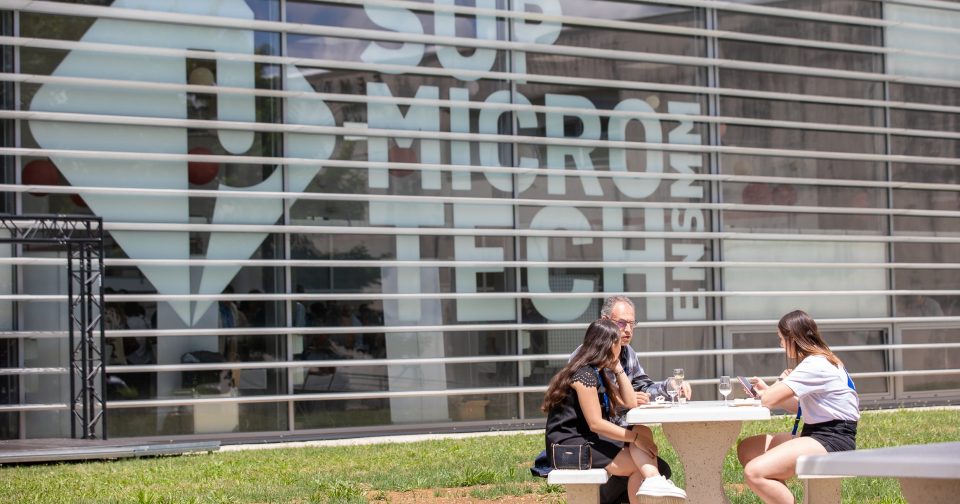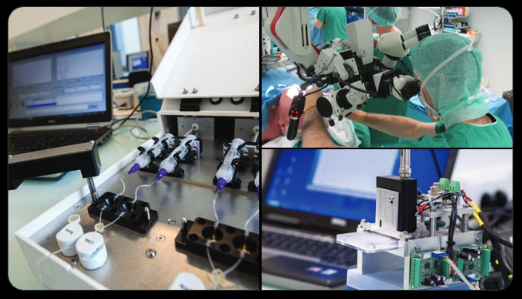Faculty position
posted on April 19, 2024
Faculty position (junior professorship): Machine-learning for the data-driven modeling of complex dynamical systems
Application deadline: 02 June 2025 (4pm, CET)
Start date: Sept. 2025
SUPMICROTECH (École Nationale Supérieure de Mécanique et des Microtechniques) and the Dept of Automation and Robotics, FEMTO-ST Institute in Besançon, France are advertising an exciting new faculty position on the topic of Scientific machine learning (machine learning for the data-driven modeling of complex dynamical systems), with possible application (but not limited) to the scope of the Neuro research group.
The position is a junior professorship (“chaire de professeur junior”), a new type of position intended as a priviledged fast-track to a Full Professorship position (“professeur des universités”). It consists of an initial fixed-term period leading (3-5 years depending on experience) leading, upon successful review, to direct promotion at the rank of Full Professor. This is a primarily research-oriented position, with a reduced teaching load of 64 hours (96 HETD) per year (equivalent to two one-semester courses). Upon successful review at the end of the tenure period, the position will be turned into a permanent/tenured full professor position in the French university system with the standard teaching load of 128 hours (192 HETD, or four one-semester courses) per year. The initial monthly gross salary will be around 3500 Euros (depending on experience), and include a generous 320k€ research startup package (tentatively: funding for 2 PhD students and one postdoc).
The position is opened for applications from May 2nd to June 2nd, 2025, with a start date in the 2025-2026 academic year (Sept. 2025). Applications should be made solely via the national Odyssée portal at https://odyssee.enseignementsup-recherche.gouv.fr/ - see application information below. Before submitting their application, we strongly encourage applicants to make contact with the FEMTO AS2M and SUPMICROTECH research teams in order to adapt their research and teaching statements to the strategic directions of the two institutions: see contact information below.
Research profile
The recruited faculty is expected to join the Dept of Automation and Robotics (Automatique et Systèmes Micromécatroniques, AS2M) of the FEMTO-ST Institute, of which SUPMICROTECH is one of the host operating institutions.
The aim of this faculty position is to set up a research program around the theme of explainable and physically-informed AI for modeling dynamical systems, and to steer a strong and original vision for the place of AI both in the research of the AS2M Dept, and in the SUPMICROTECH teaching curriculum. The new faculty is expected to develop a research agenda towards inventing the next generation of scientific machine-learning tools for controlling complex physical or physiological systems, by using a data-driven approach to discover physically interpretable models of dynamical systems based on temporal data (instead of studying such systems analytically).
Machine learning for the data-driven estimation of dynamical systems is a strongly emerging field in machine-learning (see, for example, the recent AI Institute in Dynamic Systems at the University of Washington in Seattle, the L4DC cycle of international conferences, or the AI for Science Center at CNRS). Relevant to this field are recently introduced methologies such as symbolic regression methods (SINDY; Brunton et al. 2016), operator learning (Boullé et Townsend, 2024), surrogate systems (Durstewitz, Koppe & Thurm, 2023) or physics-informed neural networks (Karniadakis et al. 2021).
Research conducted within the AS2M department is based on a multi-disciplinary foundation combining mechatronics, automation and data science. Applications of machine learning for dynamical systems is central to the Department’s recent work, whether in the control of innovative robotic architectures (e.g. flexible and dexterous robotics), the modeling of unconventional physical systems at micro/nanometric scales (e.g. machine-cell interaction) or the prediction of complex dynamical systems in the fields of industrial, environment or health monitoring (e.g. identifying dynamical systems from neurobiological data).
At AS2M, the new faculty’s research agenda is expected to foster new cross-disciplinary projects combining, for example, modeling and control, or control and prediction, and may in particular capitalize on the department’s strong momentum in the field of micro/healthcare technologies, with applications at the level of the cell (e.g. cell characterization), organ (e.g. sensors for oncology diagnostics), or organism (e.g. neurosciences). Notably, if concerned with neuroscience, the new faculty’s research agenda will benefit from an extensive in-house facility for healthy-participant EEG recording, as well as an ongoing partnership with the GHU Paris Hospital for intracranial and clinical EEG data collection in patients (https://neuro-team-femto.github.io).
Teaching profile
The recruited person will be part of the SUPMICROTECH computer science teaching department and contribute to training the school’s engineering curriculum by strengthening the link between training and research.
The faculty is expected to contribute to the “artificial intelligence for engineers” theme and participate to the strategic overhaul of SUPMICROTECH’s teaching curriculum in digital/data-science and AI for industry. They will develop AI teaching focused on explainability, physically-informed AI and scientific machine-learning, in interaction with the micro-mechatronic, microrobotic and biological systems or biological systems studied at the School, with a focus on the physical meaning of the models and/or their use in control or prediction frameworks.
The teaching load during the tenure-track period is 64 hours (96 HETD) per year (equivalent to two one-semester courses). Upon successful review at the end of the tenure period, the position will be turned into a permanent/tenured full professor position in the French university system with the standard teaching load of 128 hours (192 HETD, or four one-semester courses) per year.
About the environment
The recruited person will be hired by the SUPMICROTECH School of Engineering, for teaching in the School’s accredited engineering program, and will conduct their research in the FEMTO-ST Institute, all co-located in Besançon, France.
 SUPMICROTECH-ENSMM, one of the founding members of the Université Bourgogne-Franche-Comté (UBFC), is a public higher-education institution training accredited multi-disciplinary engineers in mechanical systems, mechatronics and microsystems. Authorized by the French Ministry of Education, Higher Education and Research, the SUPMICROTECH diploma has been recognized by the Commission des Titres d’Ingénieur since 1934. SUPMICROTECH recruits mainly at Bac + 2 level and, after 3 years, awards three engineering diplomas leading to a Master’s degree. Graduates of the school are versatile engineers, able to work in R&D, design, production or marketing.
SUPMICROTECH-ENSMM, one of the founding members of the Université Bourgogne-Franche-Comté (UBFC), is a public higher-education institution training accredited multi-disciplinary engineers in mechanical systems, mechatronics and microsystems. Authorized by the French Ministry of Education, Higher Education and Research, the SUPMICROTECH diploma has been recognized by the Commission des Titres d’Ingénieur since 1934. SUPMICROTECH recruits mainly at Bac + 2 level and, after 3 years, awards three engineering diplomas leading to a Master’s degree. Graduates of the school are versatile engineers, able to work in R&D, design, production or marketing.
 With more than 750 researchers, the FEMTO-ST Institute (CNRS/Université de Bourgogne Franche-Comté) was created just about 20 years ago, and has grown to become the country’s largest public CNRS engineering lab, with expertise covering all fields of system science. FEMTO’s Department of Automation and Robotics hosts about 80 researchers active in the fields of robotics, mechatronics, automatic control and artificial intelligence.
With more than 750 researchers, the FEMTO-ST Institute (CNRS/Université de Bourgogne Franche-Comté) was created just about 20 years ago, and has grown to become the country’s largest public CNRS engineering lab, with expertise covering all fields of system science. FEMTO’s Department of Automation and Robotics hosts about 80 researchers active in the fields of robotics, mechatronics, automatic control and artificial intelligence.
 We’re located in Besançon, a world-heritage UNESCO site close to the French-Swiss mountains of Jura, within easy train access from Paris and most major european travel hubs. Besançon is a vibrant, mid-size regional capital city regularly ranking best-in-France for its quality of life and surface green spaces per inhabitant, but also boasts a newly-federated university (Université de Bourgogne Franche-Comté) of more than 50k students.
We’re located in Besançon, a world-heritage UNESCO site close to the French-Swiss mountains of Jura, within easy train access from Paris and most major european travel hubs. Besançon is a vibrant, mid-size regional capital city regularly ranking best-in-France for its quality of life and surface green spaces per inhabitant, but also boasts a newly-federated university (Université de Bourgogne Franche-Comté) of more than 50k students.
Applications
The position being funded at a national level, applications should be submitted solely via the national Odyssée portal at: https://www.galaxie.enhttps://odyssee.enseignementsup-recherche.gouv.fr/procedures/recrutement-ec/offres-poste/fiche-offre-poste/252843. Please note that the Odyssée portal is a centralized system in the French academic system, requiring the creation of an account and which various operations may be error-prone. Please plan accordingly for submitting your application, and seek advice from the contact persons below if needed.
Job reference: 252843
Job description: https://odyssee.enseignementsup-recherche.gouv.fr/procedures/recrutement-ec/offres-poste/fiche-offre-poste/252843 [local copy]
Deadline: 2 June 2025 (4pm CET).
–>
Note: the application material in Odyssée includes a document called “analytical presentation” (presentation analytic). This is in fact is meant to be the main document of your application package and should include, in a single document: a narrative CV ; a teaching statement including both a description of previous teaching experience and a teaching project (“projet d’intégration enseignement”) detailing the applicant’s proposed teaching and curriculum development in Supmicrotech; a research statement including both a description of previous research results and a research program (“projet d’intégration recherche”) detailing the applicant’s proposed research in FEMTO-ST; and a traditional academic CV (including funding and supervision experience). Format is free - the previous application portal (Galaxie, now replaced by Odyssée) included a proposed application form which can be used as a template if needed, although not necessarily.
Upon application, a pre-selection of applications will be made by the search committee. Successful candidates will then be invited for an interview, tentatively the week of 10th July 2025, which will include a presentation of their research and teaching project, as well as a mock teaching session, the details of which will be specified in the invitation.
Before submitting their application, we strongly encourage applicants to make contact with the FEMTO AS2M and SUPMICROTECH research teams in order to adapt their research and teaching programs to the strategic directions of the two institutions:
- General contact for research:
Prof. Yann Le Gorrec, Department Chair, Dept. of Automation and Robotics, FEMTO-ST Institute. yann.le.gorrec@ens2m.fr
- Specific contact for a neuroscience research agenda if relevant:
Dr Jean-Julien Aucouturier, PI Neuro group, Dept. of Automation and Robotics, FEMTO-ST Institute. aucouturier@gmail.com
- Contact for teaching statement:
Prof. Christophe Varnier, Head of Studies, SUPMICROTECH/ENSMM. christophe.varnier@ens2m.fr